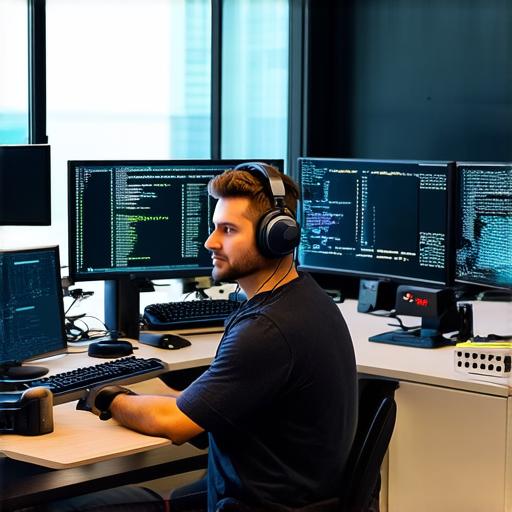Conceptualization
The first step in creating a video game is conceptualization. This involves brainstorming ideas for the game’s story, characters, mechanics, and overall design. A video game developer who specializes in conceptualization will work closely with the game’s creative director to develop these initial ideas into a cohesive and engaging game vision.
One of the key responsibilities of a video game developer during this stage is to conduct market research. They will analyze data on player preferences, trends in the gaming industry, and competitor activity to ensure that their game idea is unique and compelling. In addition, they will work with other members of the development team to create a project plan and budget, and determine the resources needed to bring the game to life.
Design
Once the initial concept for the game has been established, the next step is design. This involves creating detailed specifications for the game’s mechanics, story, characters, and visuals. A video game developer who specializes in design will work closely with the creative director to develop these specifications into a clear and concise game design document (GDD).
During this stage, a video game developer will also create wireframes and prototypes of the game’s user interface and mechanics. These are used to test and refine the game design, as well as to communicate the design to other members of the development team. In addition, they will work with programmers to ensure that the game mechanics are technically feasible and can be implemented within the game engine.
Programming
Programming is a critical component of video game development. It involves writing code to implement the game’s mechanics, create user interfaces, and manage system resources such as memory and processing power. A video game developer who specializes in programming will work closely with other members of the development team to create a clear and detailed technical specification for the game.
During this stage, a video game developer will also work with artists and designers to optimize the game’s performance by minimizing load times, reducing memory usage, and improving frame rates. In addition, they will work with testers and QA teams to identify and fix bugs and other issues that could affect the game’s stability or usability.
Art
Art is another critical component of video game development. It involves creating visual assets such as characters, environments, and objects that bring the game world to life. A video game developer who specializes in art will work closely with other members of the development team to create a clear and detailed art style guide that outlines the visual elements of the game.
During this stage, a video game developer will also work with animators and motion capture artists to create realistic character movements and interactions. In addition, they will collaborate with sound designers to create an immersive audio experience that enhances the overall gameplay experience.
Testing and QA
Testing and quality assurance (QA) are essential stages of video game development. They involve identifying and fixing bugs, improving performance, and ensuring that the game meets its technical and creative requirements. A video game developer who specializes in testing and QA will work closely with other members of the development team to create a comprehensive test plan that covers all aspects of the game’s functionality.
During this stage, a video game developer will also work with testers to create test cases and scripts that automate testing of key features and systems. In addition, they will analyze test results and track bugs and issues through the development process to ensure that they are fixed in a timely and effective manner.
Marketing

Marketing is an essential component of video game development. It involves creating a buzz around the game and generating interest from potential players. A video game developer who specializes in marketing will work closely with the game’s producers and publishers to develop a comprehensive marketing plan that includes advertising, social media, PR, and other promotional activities.
During this stage, a video game developer will also work with influencers and content creators to generate buzz around the game and build a community of players who are excited about its release. In addition, they will track and analyze player engagement data to identify trends and optimize marketing campaigns for maximum impact.
Monetization
Monetization is another critical aspect of video game development. It involves creating a business model that generates revenue from the game through sales, subscriptions, advertising, or other means. A video game developer who specializes in monetization will work closely with the game’s producers and publishers to develop a clear and detailed monetization plan that aligns with the game’s overall goals and objectives.
During this stage, a video game developer will also work with analytics teams to track player spending and behavior patterns, and identify opportunities for revenue growth. In addition, they will collaborate with other developers and publishers to create cross-promotional campaigns that drive additional revenue from the game.
Case Studies
Let’s take a look at some real-life examples of how the responsibilities of a video game developer have contributed to the success of popular games.
Minecraft
Minecraft is one of the most successful video games of all time, with over 100 million copies sold and a dedicated player base that spans across multiple platforms. The game was developed by Markus Persson (also known as Jeb), who specialized in programming and design.
During the development process, Persson worked closely with other members of the development team to create a clear and detailed technical specification for the game. He also created wireframes and prototypes of the game’s user interface and mechanics, which allowed him to test and refine the game design before launching it to the public.
Persson’s programming skills were also critical to the success of Minecraft. He wrote code that enabled players to create and manipulate objects in the game world, which gave players a sense of agency and creativity that was unprecedented for video games at the time. In addition, he worked with artists and designers to optimize the game’s performance, minimizing load times and improving frame rates.
The Witcher 3: Wild Hunt
The Witcher 3: Wild Hunt is another highly successful video game that showcases the skills and responsibilities of a video game developer. The game was developed by CD Projekt Red, which specializes in design and programming.
During the development process, CD Projekt Red worked closely with other members of the development team to create a clear and detailed GDD for the game. They also created wireframes and prototypes of the game’s user interface and mechanics, which allowed them to test and refine the game design before launching it to the public.
CD Projekt Red’s programming skills were critical to the success of The Witcher 3. They wrote code that enabled players to explore an open-world game world filled with complex characters, environments, and quests
